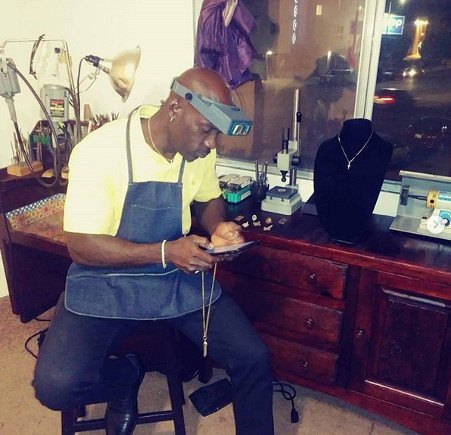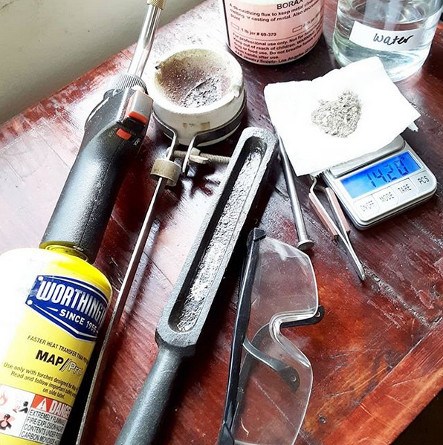Becoming a professional jeweler is a great career option. Even in today's changing economy, skilled workers and craftsman such as jewelers possess skills that cannot be easily replaced or outsourced. This makes it a safe career option. Keep reading below to learn more about what it takes to become a jeweler.
Salary Expectations
Statistically jewelers earn a mean hourly wage of $20.28. This is according to the Bureau of Labor. If you work full-time then this comes to around $42,000 per year. This number is just an average, and you have the potential earn much more. Coastal states such as New York, California, and Florida employ the highest number of jewelers. Goldsmiths and silversmiths are similiar professions and they make around the same amount of money as jewelers.
In addition, you can make more money by having your own jewelry store. Of course this require more investment and more commitment.

Education
When you begin your journey in becoming a jeweler, you'll have several different paths that you can take to learn the required skills. You can enroll in a program at a university or community college, enroll at a trade school, or take on an apprenticeship. We'll explore each option below.
Universities and Community Colleges
For those who are academically inclined, there are universities that offer programs in jewelry design that will give you a bachelors degree upon completion. A list of schools that offer these programs can be found here.
The degree you earn after completing a university program will typically be a Bachelors of Fine Arts with a concentration in Jewelry Design and Metalworking. Since these are formal programs being offered at an accredited university, you'll be expected to take other classes as well. These classes could include drawing, art history and general education subjects.
Core courses for this degree would include: fabrication, casting, CAD, and stone setting. In some cases you would also be expected to complete a final senior project before graduation.
For more information on bachelor degree programs, you can view the specific program requirements for RIT and Savannah College of Art and Design.
If a four year program is too big of a commitment, then a two year associates degree can be a good option. An associates degree in jewelry design will still have courses that aren't directly related to jewelry production but not to the same extent as four year programs. In additon, some institutions also offer certifications instead of degrees for those who are looking for an even quicker path.
For more information on associates degree programs, you can view the specific program requirements for Santa Fe Community College and Pasadena City College.
Trade Schools
A trade school is a great option for hands on, jewelry making experience. There are good trade schools all across the country, but not all of them offer specializations in jewelry making. An example of a good trade school is the The Gemological Institute of America (GIA). Their Graduate Jeweler Program trains students in practical jeweler skills such as polishing and fabricating gems, stone setting, and applying finishes to surfaces. For more information about what the GIA teaches, visit this link.

Apprenticeships
If you want to get hands-on experience right away or you're having trouble with finding employment as a jeweler, then consider taking an apprenticeship with an established jeweler. The length of an apprenticeship varies. In some cases they range from one week to a few months. However it's better to have a long apprenticeship in order to learn and perfect your skills.
To get an apprenticeship, it's usually best to approach some of the jewelers in your area and ask if they would be willing to take you on as an apprentice. Let the jeweler know that your primary goals are to get experience and to put your skills to use in a professional setting. If you do well then you might even be brought on as a full-time employee.
Joining a Professional Organization
To further strengthen your credentials, joining a professional trade organization is a good career move.
Jewelers of America
Jewelers of America is a well-respected professional organization. They are a national trade organization composed of workers from different aspects of the jewelry industry ranging from designers and bench workers to salesman and jewelry store managers. Some benefits offered to its members are: certifications, marketing and advertising services done on your behalf, and discounts on training programs.
Manufacturing Jeweler and Suppliers of America
The Manufacturing Jeweler and Suppliers of America (MJSA) is another professional jeweler organization that is worth checking out. For over a century, the MJSA has provided resources and services for people working in the jewelry industry. These resources range from marketing, training, employment resources and other areas relevant to workers in the jewelry industry. The MJSA website also has a Career Center section with job listings.
A membership in the MJSA provides a wide range of benefits. A jeweler who is a member of the MJSA gets placed in the MJSA Retail Link, a publication sent to jewelry distributors varying from small local stores to large chains such as Macy's and Nordstrom. This placement means that a MJSA member can advertise their services and products to over 20,000 retailers. MJSA members also get access to services that can help build up their businesses. Financing and business consulting are among these services.
The MJSA is also behind an initiative called BEaJEWELER which aims to help train the next generation of jewelers. BEaJEWELER has a database of over 200 training programs around the country for anyone interested in starting their career as a jeweler. In addition, there is a mentorship program where they seek to pair veteran jewelers with people looking to learn from them. The BEaJEWELER website also contains useful information on what to expect working as a jeweler.
Conclusion
Becoming a jeweler requires the mastery of a wide assortment of skills. The resources provided above will set you on the path to acquiring these skills. If you work and study hard then you will be rewarded with a high-paying career in the jewelry industry.
